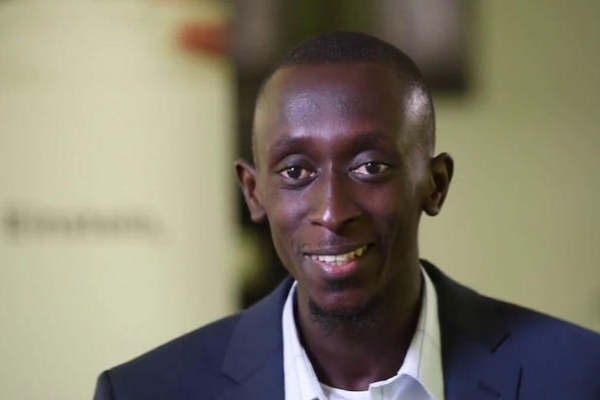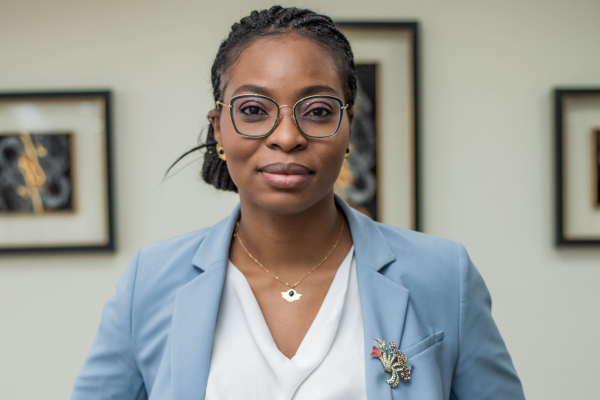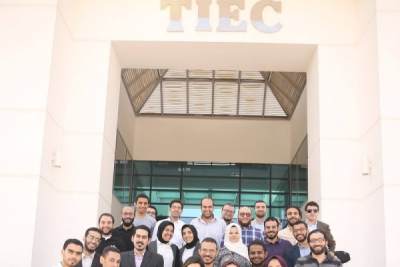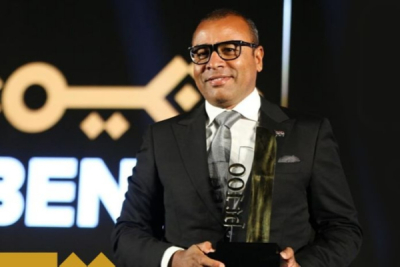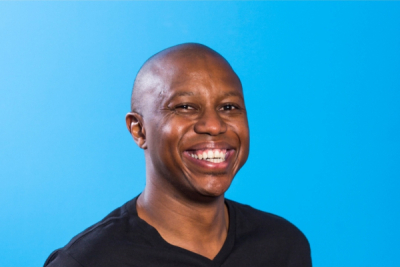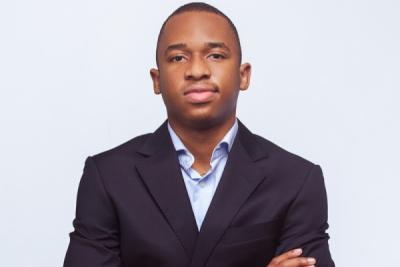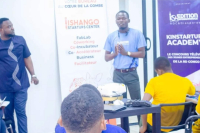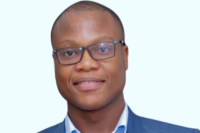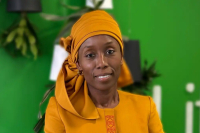
TECH STARS (1007)
The Senegalese entrepreneur leverages robotics to streamline operations for businesses and institutions. He leads a company that enables users to remotely control autonomous robots from any location.
Senegalese innovator, education expert, and serial entrepreneur Sidy Ndao (photo), born in 1987, is the founder and CEO of Caytu, a startup specializing in participatory assisted teleoperation for autonomous robotics.
Established in 2021, Caytu provides a participatory robotics platform that enables autonomous robots to be remotely piloted by outsourced pilots worldwide. The platform assists companies in task creation, robot assignment, deployment management, and fleet data analysis. Its software can integrate any robotics hardware or application through its API.
Caytu also offers a virtual training platform to cultivate a global workforce of autonomous robot operators. The digital platform equips operators with the necessary skills to operate robots safely and efficiently.
Ndao is also the founder and president of the Dakar American University of Science and Technology. Established in 2017, the university offers teaching and research opportunities in engineering and technology for undergraduate and graduate students, aimed at developing technological solutions to address Africa’s societal needs and challenges.
An education consultant with the World Bank Group, Ndao founded the Pan-African Robotics Competition in 2015. The competition brings together robotics teams from colleges and high schools across Africa and its diaspora.
Ndao earned his master’s degree in mechanical engineering from The City College of New York in 2007. He is also a graduate of Rensselaer Polytechnic Institute, where he defended his doctoral thesis in mechanical engineering in 2010. He spent a year (2011-2012) at the Massachusetts Institute of Technology as a postdoctoral associate. From 2012 to 2021, he served as an assistant professor and then associate professor in the Department of Mechanical and Materials Engineering at the University of Nebraska-Lincoln.
Melchior Koba
Last Wednesday, Guinea's President Mamadi Doumbouya reshuffled his cabinet. Rose Pola Pricemou, previously Minister of Planning and International Cooperation, was named Minister of Posts, Telecommunications, and the Digital Economy.
Guinean IT expert and politician, Rose Pola Pricemou (photo), has been appointed as the country’s Minister of Posts, Telecommunications and the Digital Economy, taking office on March 16, 2024, under the chairmanship of Benoit Kamano, Minister and Secretary-General of the Government.
“In the continuity of progress, my team and I are determined to continue the efforts undertaken by my predecessors,” Pricemou said in her inaugural speech.
Pricemou pledged to continue the digitization of public services for increased efficiency and to bolster the security of electronic transactions. She also plans to ensure the safety of public and private information systems to foster a secure and resilient Guinean cyberspace. Additionally, she aims to expand the services of the Guinean Post for broader national coverage, with a focus on financial services and e-commerce.
Before her latest appointment, Pricemou served as the country’s Minister of Planning and International Cooperation since November 2022. She joined the government in 2021 as Minister of Information and Communication, and from August to November 2022, she held the position of Minister of Trade, Industry and SMEs.
Pricemou, a graduate of the University of Montreal, Canada, earned a master’s degree in computer science in 2008. She also holds a master’s degree in information technology management from Laval University in Quebec City, obtained in 2010.
Pricemou’s professional career began in 2009 at the Ministry of Revenue of the Republic of Guinea as a functional analyst. In 2010, she joined Nurun, an IT services and consultancy company, as an IT systems development and integration consultant. She also served as the director of the strategy and development office of the ministry responsible for investment and public-private partnerships from March 2019 to January 2022.
Melchior Koba
TIEC is committed to fostering innovative ideas that positively transform the country. It offers training programs and collaborative spaces essential to the growth and success of entrepreneurs.
The Technology Innovation and Entrepreneurship Center (TIEC) is an innovation center affiliated with the Egyptian Ministry of Communication and Information Technology. Since its inception in September 2010, the center has been dedicated to catalyzing innovation and entrepreneurship, driving tangible impact across Egypt.
The TIEC seeks to unleash creative solutions and innovative ideas that have an impact on Egypt. On its website, it says it aims to spur innovation and entrepreneurship in Egypt, fostering a knowledge-based economy. To achieve this, the center develops strategies, provides facilities, and promotes intellectual property frameworks, the website adds.
Under the leadership of its president, Hossam Osman, the center supports research and development in the local ICT industry, finances startups, and promotes Egypt as a relocation destination. It offers one-to-one professional consulting services to startups and companies in areas such as finance, digital marketing, sales, and business development. It also offers a free workspace where technology companies, investors and techstars can meet, work, learn, and collaborate.
The Technology Innovation and Entrepreneurship Center offers several programs to support young entrepreneurs, including InnovEgypt. InnovEgypt aims to turn students and graduates into successful entrepreneurs. It is a training program in innovation and entrepreneurship.
The center also organizes a series of conferences covering various technological topics. Called the TIECnovation Talks Program, this initiative aims to promote technological innovation among entrepreneurs, young professionals, recent graduates and students.
Since its inception, 509,468 people have participated in a training program organized or facilitated by TIEC. The center has supported 13,168 entrepreneurs and 2,206 startups. In addition, 7,425 ideas or solutions developed by individuals or teams have already been submitted to TIEC as a result of its programs, events, and activities. The Technology Innovation and Entrepreneurship Center has also created 71,283 job opportunities.
Melchior Koba
He has over 25 years of experience in telecommunications and technology. As head of Benya, he has led the development of award-winning digital products and services.
Ahmed Mekky (photo) is an Egyptian entrepreneur who graduated from Cairo University in 1995 with a Bachelor's degree in Computer Engineering, and from the University of Nottingham with a Master's degree in Information Technology. He is the CEO of Benya, a provider of digital solutions and ICT infrastructure in the MEA (Middle East and Africa) region.
Founded in 2017, the company offers a multitude of digital products, services and solutions. Be it telecommunication services, security and cloud solutions, large-scale data centers, manufacturing technology-based solutions and systems integration, Benya operates in various ICT verticals.
"Benya represents a long standing dream which was realized in 2017, and driven by a solid belief that digital transformation is an essential pillar to the advancement of any country. Through our 4 subsidiaries established to cater to different ICT verticals, and with an ultimate goal to provide a complete ICT value chain, our primary geographic focus is Africa and the Middle East," explains Mekky.
The entrepreneur is also a board member of the Endeavor Egypt entrepreneurial community. He is also Chairman of Fiber Connect Council MENA, an industry organization that aims to accelerate the availability of fiber-based ultra-high-speed access networks for consumers and businesses.
Before Benya, Ahmed Mekky co-founded Gulf Bridge International (GBI) in 2008, where he was a board member until 2017 and Chairman and CEO until 2015. GBI is a global provider of cloud, connectivity and content services that owns and operates a fully managed, intelligent service network.
The entrepreneur has received several awards for his impact on digital transformation in the MEA region. He received the Industry CEO of the Year award issued in 2020 by Telecom Review. In 2021, he received the Excellence in Digital Transformation Award from Business Today Magazine and the Merit Leader Award from Telecom Review. In 2022, he received the Embracing Modernization Award from Business Today Magazine.
Melchior Koba
Through Yoco, a South African payments company, he aims to simplify processes for businesses and offer tools to boost their growth.
Katlego Maphai (photo), a South African tech entrepreneur and University of Cape Town graduate, is the co-founder and CEO of Yoco, a fintech company established in 2013 and officially launched in 2015. Yoco aims to empower entrepreneurs by providing them with innovative business tools and financial services, thereby creating new markets and avenues for success.
Yoco provides small businesses with accessible payment solutions through its Yoco App. This app enables businesses to track payments, monitor sales, and send invoices directly from their smartphones. Additionally, Yoco offers a card dispenser that can be integrated with a tablet to enhance business sales processes.
“Micro and small businesses make up the majority of businesses that drive the majority of employment in the country and contribute at least half of the GDP. And they’re just not being looked after. We just realized that we could have the highest impact on these customers, and founded the company in 2013. But we actually only launched at the end of 2015,” Maphai explained in 2022.
The tech entrepreneur embarked on his professional journey in 2003 as an intern at PricewaterhouseCoopers (PwC). He later served as a consultant at Accenture, a business services and consulting firm, in 2006. In 2008, he joined Delta Partners Group, a telecommunications consulting, corporate finance, and private equity firm. By 2012, he was part of the corporate development team at Rocket Internet, a venture capital firm and online startup incubator.
Melchior Koba
An entrepreneur with a passion for technological innovation, he offers cutting-edge technological solutions to SMEs, guiding them towards a successful digital transformation.
Mozambican entrepreneur Edilson Alberto (photo) is the founder and CEO of Tech Solutions, a software company dedicated to solving problems through technology, helping small and medium-sized enterprises (SMEs) grow in their sectors and go digital.
Founded in 2020, Tech Solutions creates solutions to everyday problems. It develops different types of websites, applications, and systems according to its customers' needs. It also does graphic design and takes care of communications and branding for companies.
The company has developed several products. These include SGDoc, E-gado, and Kaia. SGDoc is a system created for public institutions that process mailings and wish to streamline and better control document flow.
E-gado is a system designed for livestock farmers. It enables them to better control their animals and record all kinds of events with them. Kaia, meanwhile, is a platform designed for real estate agents who want to streamline the process of finding homes in Mozambique through technological means.
Alberto, who is currently studying computer science at the Illinois Institute of Technology, also serves as the Director of Entrepreneurship at Intinium, an organization within the institute that empowers students to realize their dreams and pursue their passions.
In addition, he holds leadership roles in several professional associations. He is the Vice-President of the technology sector of the Mozambican Association of Human Resources Companies and Professionals (AMEPRH) and the President of the Technology Department of the Association of SMEs of Mozambique. Since 2019, he has been a lecturer at the Institute of Innovation Technologies and Services in his home country.
Melchior Koba
Since its inception, the company has been dedicated to aiding young entrepreneurs and project leaders in transforming their concepts into profitable businesses. Over the course of seven years, it has provided training and support to more than 500 young individuals.
Kinstartup Academy, a Congolese training academy and startup incubator, has been dedicated to discovering, training, and promoting startups or project bearers wishing to establish their own businesses since its inception in 2017. The academy, founded by President and CEO Shola Deen, provides entrepreneurs with essential resources for their start-ups.
“The academy equips participants with essential information and concepts, everything an aspiring entrepreneur needs to launch into entrepreneurship and develop their business in a concrete and effective way,” Dean explains.
In addition to its training programs, Kinstartup Academy hosts a televised competition for young Congolese entrepreneurs and project leaders. The competition, which has already run for four seasons, offers training and coaching from expert trainers and experienced business leaders. The jury comprises professionals from financial institutions and business management educators.
The academy also organizes several conferences in fields such as edtech and healthtech and has established the Kinshasa Innovation Forum, a major forum dedicated to promoting innovation. Through its Face the Leopards platform, it connects investors with the entrepreneurs it has trained and supported.
To date, Kinstartup Academy has raised awareness among over 50,000 young people, identified over 2,000 project leaders, trained and supported over 500 young people, and created over 1,000 jobs. Beneficiaries of the Academy’s programs include Cedric Onaya, founder of Ebushafu, a digital waste management platform in the DRC, and Josè Rodriguez, founder of Uzuri RDC, an online shopping mall and digital marketplace offering products and services for professional sellers and individual customers.
Melchior Koba
A self-taught entrepreneur, he boasts 10+ years of experience in the field. He developed a real estate rental platform operating in Gabon and Benin.
Fulgence Menouho (photo), a self-taught entrepreneur with a passion for innovation and growth, is co-founder and CEO of Cabalou, a Gabon-based startup dedicated to helping business travelers and professionals find and book furnished accommodation.
Founded in 2021 by Menouho and Aude Késia Obiang, Cabalou is an accommodation solution designed for professionals, enabling them to book and stay in comfortable, reliable, and well-located accommodation for their activities. The startup's vision is to become the most loved, most used, and most profitable travel platform for professionals in Africa by 2030.
For accommodation owners, Cabalou offers total autonomy, from managing their accommodation to communicating with travelers and hassle-free tracking of transactions. In Gabon, the startup lists 300 apartments, 150 hosts, and has a presence in four cities. In February 2024, it added Cotonou, Benin, to its destination list.
In 2023, Cabalou was selected as part of YouthConnekt Gabon, an initiative of the United Nations Development Program. The startup received technical support and around $166,500 (XAF100 million) in funding.
Between 2014 and January 2024, Menouho independently led and pioneered entrepreneurial ventures, leveraging the Internet to assist individuals across various backgrounds in establishing their home-based businesses for income generation.
Melchior Koba
An economist turned entrepreneur, she develops digital finance products to meet the needs of individuals and businesses in Zambia.
Evelyn Chilomo Kaingu, a Zambian economist with a background in financial services and technology, is the co-founder and CEO of fintech startup Lupiya. Established in 2016 by Evelyn Chilomo Kaingu and Muchu Kaingu, Lupiya aims to make financial opportunities accessible to all Zambians by simplifying the borrowing process and conditions.
The company offers three loan programs: Personal Loans, Lupiya for Business, and Lupiya for Women. The Personal Loans program provides secured loans and loans backed by a memorandum of understanding, catering to civil servants via Zambia’s integrated payroll and settlement control system (PMEC). Lupiya for Business offers secured working capital loans to help entrepreneurs expand their businesses.
Lupiya for Women serves as a growth partner for women-led small businesses. Under this initiative, women receive management training and best practices for startups, along with financial support through flexible credit facilities. This program provides a financing opportunity for women who lack the financial resources to advance economically.
Kaingu, a 2010 Economics graduate from Cavendish University Zambia, has held various roles in her career. In 2012, she joined The SPAR Group, a South African retailer, as Finance and Administration Manager. She later worked as a data specialist at the World Bank Group in 2015 before dedicating herself full-time to her startup, Lupiya.
Melchior Koba
Boasting a career of over two decades, she brings extensive experience in the African ICT sector. Having served in key strategic and managerial roles at the Orange Group, she later transitioned to Schneider Electric, overseeing operations across sixty nations.
Senegalese computer scientist Diaretou Madina Gaye Dieng (photo) has been named President of the French-speaking Africa & Islands Cluster of Schneider Electric, a global firm specializing in the digital transformation of energy management and automation. Her appointment was announced on Friday, March 8, 2024.
From her base in Casablanca, Morocco, Dieng will oversee the group’s operations in sixty countries in the Maghreb, West and Central Africa, and the islands. She will be tasked with steering Schneider Electric’s strategy in this region, with a focus on key sectors such as infrastructure, industry, data centers, and buildings.
On her appointment, Dieng stated, “I am honored to join Schneider Electric in this region, and at a crucial time when nations and businesses around the world are seeking reliable partners for their digitalization, sustainability, and decarbonization journey. I look forward to working more closely with all our customers, partners, and key stakeholders from the public and private sectors, academia, and society to create an impact that leads to a more prosperous and sustainable future.”
Dieng holds a Master’s degree in Management Information Systems (1999) from the Centrale Lille Engineering School, a post-graduate diploma in Information Systems Management (2000) from HEC Paris, and is an alumnus of Harvard Business School Executive Education.
Before joining Schneider Electric, she served as Chief of Staff to the Managing Director of the Sonatel Group, which operates in five countries under the Orange brand (Senegal, Mali, Guinea, Guinea-Bissau, Sierra Leone). She joined the group in 2004 as Director of Marketing and Communications for the B2B commercial unit.
During her tenure at Sonatel, Dieng held successive positions as Sales Director for commercial and government customers in the B2B business unit, and Strategy and Business Development Director for the B2B business unit. In 2016, she was appointed President and CEO of Sonatel Business Solutions in Orange Senegal.
Melchior Koba
More...
Initiated by the Ivorian government, the incubator offers young project holders training sessions, partnership opportunities, and dynamic community events.
Fondation jeunesse numérique, an Ivorian incubator established by the Ministry of the Digital Economy, is designed to tackle youth unemployment through information and communication technologies. The foundation provides comprehensive support to startups to enhance their businesses.
Its mission is to promote digital entrepreneurship among young people, identify innovative projects, and provide support. It also seeks to strengthen and improve the startup support ecosystem in Côte d’Ivoire.
The foundation regularly conducts training sessions for the entrepreneurs it supports, covering a wide range of areas to enhance their managerial skills, including project management, accounting, and public speaking.
In addition to training, the incubator assists entrepreneurs with administrative procedures, providing legal guidance through collaboration with legal experts.
The foundation collaborates with investment funds and financial organizations capable of investing in high-potential projects. It organizes pitch sessions for young entrepreneurs to present their projects and has partnerships across various business sectors, aiming to foster synergies that boost the competitiveness of the supported companies.
The foundation also organizes “Caravane jeunesse numérique” (Digital Youth Caravan) to promote new digital professions among the country’s population. It also hosts an annual “inside the start-up” event to promote startups and facilitate networking in a friendly atmosphere.
Fondation jeunesse numérique has incubated several startups, including Etudesk, Cookie Labs, and Lifi-led CI. Etudesk specializes in educational technologies and offers professionally oriented online training courses. Cookie Labs uses drones and artificial intelligence to detect agricultural diseases, while Lifi-led CI aims to address issues of internet inaccessibility and energy deficits in remote areas.
Melchior Koba
A serial entrepreneur, he leverages drone technologies to collect farm data and optimize management operations.
Joseph-Olivier Biley (photo) is an Ivorian tech entrepreneur on a mission to revolutionize farm management and broaden the use of drone technologies in agriculture. He is the co-founder of JooL International, a drone startup established in 2021. The startup aims to democratize drone usage to ensure Africa has access to the necessary data for its development, particularly in the agricultural sector.
JooL International provides farmers with the ability to remotely manage their plantations, offering a range of services including Jool Lab, Jool Monitor, and Jool Audit.
Jool Lab, a drone repair and manufacturing laboratory, is proudly “made in Côte d’Ivoire.” Jool Monitor, a software suite, offers features such as agricultural plot delimitation, plant counting, aerial farm views, and plant health analysis.
Jool Audit provides an audit and analysis service, giving plantation owners insights into their plantation’s condition and factors affecting their yield. It suggests an action plan to enhance productivity and ensures transparency throughout the process.
The company has also developed the Jool Box, a smart device that allows drones to be controlled remotely from a computer or tablet. The solar-powered box is rain-resistant and capable of obstacle avoidance.
In addition to his role at JooL International, Biley heads the West Africa hub of ZEBOX, a technology startup incubator and business innovation center. He is also a co-founder of #Ci20, an association comprising Côte d’Ivoire’s most innovative and disruptive startups.
Biley, a graduate of Paris Business College and OMNES Education, was the CEO of WeFly Agri, a startup that utilized drones for remote visualization and control of agricultural plantations, from 2017 to 2021.
The entrepreneur has been recognized both domestically and internationally, receiving the Young African Personality of the Year 2020 award from Africa 35.35 and the ECOWAS Best Startup Award for JooL International in 2021.
Melchior Koba
Through innovative incubation programs, specialized training, and a host of events dedicated to innovation and entrepreneurship, ANPT aims to boost Algeria's ICT sector. It has already supported hundreds of projects and startups.
The National Agency for the Promotion and Development of Technology Parks (ANPT), an initiative by the Algerian government, is dedicated to enhancing the country's technological capabilities. Established in 2004, the agency focuses on the validation, implementation, and generalization of information and communication technologies (ICT). Sidahmed Benarbia has been serving as the Managing Director since 2020.
ANPT's primary objective is to stimulate the ICT sector by ensuring the availability of necessary tools, mechanisms, and skills. This aims to foster a national ecosystem conducive to the growth of an ICT industry that serves various sectors of the Algerian economy.
With offices in Algiers, Oran, Bordj Bou Arreridj, Ouargla, and Annaba, the agency offers a free incubation program to assist entrepreneurs and start-ups in creating and developing their products and businesses over an average of four years.
In addition, ANPT has introduced a Virtual Incubation Program (VIP) that provides future innovators nationwide with free access to its online services. The VIP program utilizes digital platforms developed by the agency, such as ANPT Meet for online meetings and ANPT Learn for e-learning and e-training.
The agency also designs training programs focusing on three key areas: ICT, business creation and management, and personal development. Upon request and based on need, the agency offers additional training courses in various fields.
ANPT regularly hosts activities and events centered around ICT and entrepreneurship, including seminars, conferences, workshops, and webinars. To date, it has organized over 200 events, hosted more than 45 companies, and supported over 800 start-ups and projects.
Melchior Koba
A serial entrepreneur, he has helped set up several technology companies in Algeria and the United Arab Emirates. His latest venture, Goubba, offers a platform for businesses to enhance employee loyalty and motivation through benefits programs.
Algerian tech entrepreneur Yacine Benmosbah (photo) is the founder and CEO of Goubba, a company that provides a suite of services aimed at enhancing employee benefits, wellness, and corporate gifting in Algeria. Established in 2021, Goubba’s digital platform is designed to improve the day-to-day experiences of employees, offering services such as FitPass, Tickets-Resto, and Carte-Cado.
FitPass grants access to over 120 gyms throughout Algeria, promoting an active and healthy lifestyle. Tickets-Resto is a digital meal voucher service partnered with over 500 restaurants and supermarkets, providing a flexible solution for employee meals. Carte-Cado allows Goubba to offer personalized gift cards from a range of top brands, incentivizing and rewarding employees, partners, and customers.
Benmosbah, a serial entrepreneur, co-founded VYBZ in 2015, a social music network that bridges the gap between established artists, emerging musicians, and music fans by facilitating musical challenges and tournaments. In 2016, he launched Adoo Advertising, a UAE-based rewards and coupons app that allows users to earn points by engaging with various ads, which can be exchanged for free vouchers and coupons at their favorite restaurants and retail stores.
In 2018, he also founded Batr, an AI-powered peer-to-peer marketplace for buying and selling second-hand goods. Before these ventures, he served as a board member and CTO of VentureFin, an online platform for participatory investment and lending.
Melchior Koba


